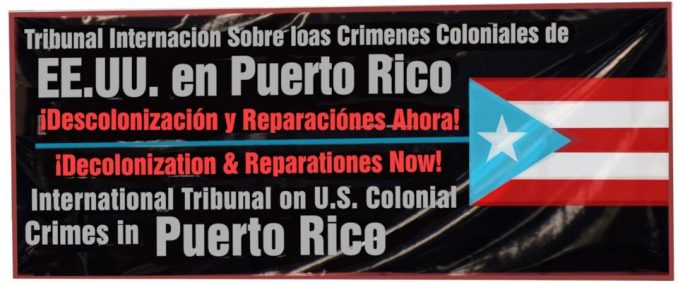Puerto Rico Tribunal: Summary of indictment of the U.S.
 The following is a brief summary of the indictment prepared by chief prosecutor Augusto Zamora for the International Tribunal on U.S. Colonial Crimes in Puerto Rico on Oct. 27 in New York City. For full indictment, see tinyurl.com/ycnredld.
The following is a brief summary of the indictment prepared by chief prosecutor Augusto Zamora for the International Tribunal on U.S. Colonial Crimes in Puerto Rico on Oct. 27 in New York City. For full indictment, see tinyurl.com/ycnredld.
1. Puerto Rico, a supposed “Free Associated State” under the constitution of 1952, continues to be a colony of the United States. The U.S. maintains Puerto Rico under colonial domain, with the subterfuge of “Free Associated State,” an entity of colonialist origin, with which the U.S. flagrantly violates the world legal order, which constitutes a crime against Puerto Rico.
2. The “constitution” of Puerto Rico, proposed in 1952 and approved by the U.S. Congress in 1953, predates by eight years the decolonization process promoted by the United Nations. In 1952, Puerto Rico was occupied by U.S. military forces, and thus its people’s choices regarding the referendum were not free. In addition, the constitution of a sovereign nation (according to the U.N.) should never be subject to the approval and scrutiny of the colonial power, as it was here.
3. By submitting the case of Puerto Rico to the General Assembly of the United Nations, the United States was accepting, on the one hand, that Puerto Rico was a colonial nation and that the United Nations had jurisdiction over Puerto Rico because it was the country subjected to colonial rule.
4. The deprivation of that inalienable right to a lawful and reliable exercise (of self-determination) under the supervision of the United Nations bears full witness that the regime in Puerto Rico is a blatantly colonial regime, and the U.S. uses this regime to keep Puerto Rico under U.S. colonial domination. Maintaining Puerto Rico as a colony is a violation of the world legal order, and it constitutes a crime against the people of Puerto Rico; as such it should be denounced.
5. By approving and enforcing the so-called PROMESA law, the United States has acted as a colonial power over the territory of Puerto Rico, violating even the null-and-void process of 1952. With that law, the U.S. has returned Puerto Rico to the situation it had in 1898, violating the substantive rights of the Puerto Rican people, such as their right to freedom, self-determination and the right to their natural wealth and resources. The U.S. commits a crime against the people of Puerto Rico by usurping their freedom, denying their self-determination and violating the sacred right of the Puerto Rican people to their natural wealth and resources.

